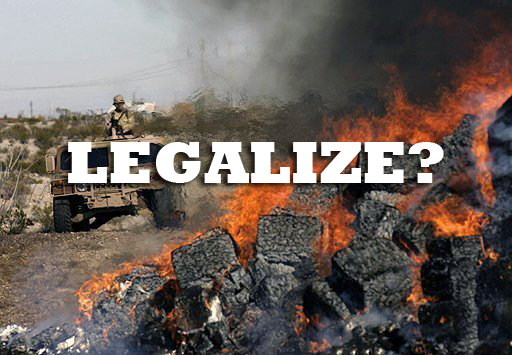World Leaders Urging Obama and Mexico’s Calderón to End Drug War

Decades have passed by. Hundreds of thousands have been killed. Millions incarcerated. With no end in sight. Today world leaders plea an end to criminalization. Is it time to legalize drugs? – Axel
###
Via LA TIMES
By Ken Ellingwood and Brian Bennett, Los Angeles Times
Reporting from Mexico City and Washington— Calling the global war on drugs a costly failure, a group of high-profile world leaders is urging the Obama administration and other governments to end “the criminalization, marginalization and stigmatization of people who use drugs but do no harm to others.”
A report by the Global Commission on Drug Policy, which includes former U.N. Secretary-General Kofi Annan and past presidents of Mexico, Brazil and Colombia, recommends that governments try new ways of legalizing and regulating drugs, especially marijuana, as a way to deny profits to drug cartels.
The recommendation was swiftly dismissed by the Obama administration and the government of Mexico, which are allied in a violent 4 1/2 -year-old crackdown on cartels that has killed more than 38,000 people in Mexico.
“The U.S. needs to open a debate,” former Colombian President Cesar Gaviria, a member of the panel, said by telephone from New York, where the report is scheduled to be released Thursday. “When you have 40 years of a policy that is not bringing results, you have to ask if it’s time to change it.”
An advance copy of the report was provided to The Times.
Three of the report’s Latin American signatories, Gaviria and former Presidents Ernesto Zedillo of Mexico and Fernando Henrique Cardoso of Brazil, made similar recommendations two years ago. Their views failed to change the enforcement-based approach that dominates drug policies worldwide.
Mexican President Felipe Calderon, a conservative, has made the battle against drug cartels a centerpiece of his administration. Although the growing death toll has stirred widespread public dismay in Mexico, Calderon shows no sign of turning back before his six-year term ends next year. A poll on security matters released Wednesday found broad public opposition in Mexico to legalizing drug sales.
The U.S. government has backed the Mexican crackdown with law enforcement equipment, training and encouraging words from President Obama.
“Making drugs more available — as this report suggests — will make it harder to keep our communities healthy and safe,” said Rafael Lemaitre, spokesman for the White House Office of National Drug Control Policy.
Although the Obama administration has emphasized a “public health” approach to drug policy, officials have taken a hard line against legalization.
“Legalizing dangerous drugs would be a profound mistake, leading to more use, and more harmful consequences,” drug czar Gil Kerlikowske said this year.
Administration officials dispute the idea that nothing can be done to reduce the demand for drugs in the United States. A spokesman for the White House drug agency said U.S. consumption peaked in 1979, when surveys showed that 14% of respondents had used illegal drugs in the previous month. Now that figure has dropped to 7%.
“This is not a problem for law enforcement alone,” Kerlikowske said in February at the George Washington University in Washington.
In its 2012 budget, the administration has requested $1.7 billion for drug prevention programs, a 7.9% increase from the previous year.
Administration officials have promoted the use of drug courts where judges can sentence offenders to treatment and other terms as alternatives to jail time. The White House also is working to expand reentry programs that aim to reduce recidivism rates by assisting the nearly 750,000 drug offenders released from prison each year to transition more easily back into communities.
Vanda Felbab-Brown, a fellow at the Brookings Institution who has examined U.S. drug policy, said the Obama administration has pushed the issue in a “considerably better direction. Nonetheless, she added, “a lot of it stayed at the level of strategy and rhetoric.”
“If [Obama] is going to spend his political capital on something, it won’t be drug policy,” said Felbab-Brown, author of “Shooting Up: Counterinsurgency and the War on Drugs.”
Gaviria, the former Colombian president, said he saw signs of a shift in opinion last year, when Californians voted on a ballot measure that would have legalized possession of small amounts of marijuana. Although the measure failed, “people are changing their minds,” he said.
The new report said the world’s approach to limiting drugs, crafted 50 years ago when the United Nations adopted its “Single Convention on Narcotic Drugs,” has failed to cut the supply or use of drugs. The report, citing figures from the world body, said global marijuana consumption rose more than 8% and cocaine use 27% between 1998 and 2008.












Be the first to comment
Sign in with